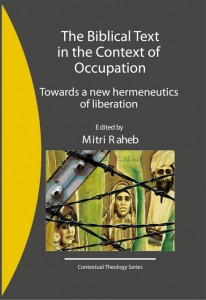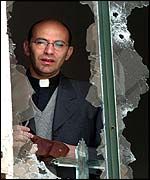 The Rev. Dr. Mitri Raheb has edited a new book called The Biblical Text in the Context of Occupation: Towards a new hermeneutics of liberation. A wide variety of scholars write on the importance and meaning of the biblical narrative in the midst of occupation and the need for liberation in the Palestinian context. Read more about it and find it soon on Amazon.com.
The Rev. Dr. Mitri Raheb has edited a new book called The Biblical Text in the Context of Occupation: Towards a new hermeneutics of liberation. A wide variety of scholars write on the importance and meaning of the biblical narrative in the midst of occupation and the need for liberation in the Palestinian context. Read more about it and find it soon on Amazon.com.
Here is the table of contents:
1. Toward a New Hermeneutics of Liberation : A Palestinian Christian Perspective Mitri Raheb
2. Engaging the Palestinian Theological-Critical Project of Liberation: A Critical Dialogue Fernando F. Segovia
3. Palestinian Theology: Between Construction and Identification: A Comparative Analysis of the Theology of Naim Stifan Ateek and Mitri Raheb Peter Lodberg
4. Toward an Emancipatory Palestinian Theology: Hermeneutical Paradigms and Horizons Luis N. Rivera-Pagán
5. (Home)Land, Diaspora, Identity, and the Bible in Imperial Geopolitics: What does the Asia-Pacific Region have to do with Israel-Palestine? Eleazar S. Fernandez
6. Interpreting the Bible, Interpreting the World: Anglo-American Christian Zionism and Palestinian Christian Concerns Robert O. Smith
7. The Hermeneutical Predicament: Why We Do Not Read the Bible in the Same Way and Why it Matters for Palestinian Advocacy Julia M. O’Brien
8. Talmudic Terrorism in Bethlehem Santiago E. Slabodsky
9. One Text, Many Meanings: Reading a non-Zionist Judaism from the Hebrew Bible Steven Friedman
10. The Contribution of Hermeneutics to Peace and Reconciliation J.H. (Hans) de Wit
11. Arab Christian Fundamentalist Reading of the Book of Daniel: A Critique Munther Isaac
12. Biblical Hermeneutics in the Kairos Palestine Document Jamal Khader
13. The Context of the Christians of the Arab World as a Key to Biblical Interpretation according to the Six First Pastoral Letters of the Eastern Catholic Patriarchs Rafiq Khoury
14. I Am a Presbyterian Christian: Toward a Dialogical Contextual Hermeneutics Patricia K. Tull
15. What has the Bible to do with us? Erik Aurelius
16. The Theological and Historical David: Contextual Reading Samuel Pagán
17. The Ambiguity of Identity and Responsibility toward the Other Dexter Callender, Jr
18. “Contact Zone”: Exploring Land, Liberation, and Life Yak-Hwee Tan
19. The Dignity of Resistance in Solidarity: The Story of Rizpah Allan Boesak

